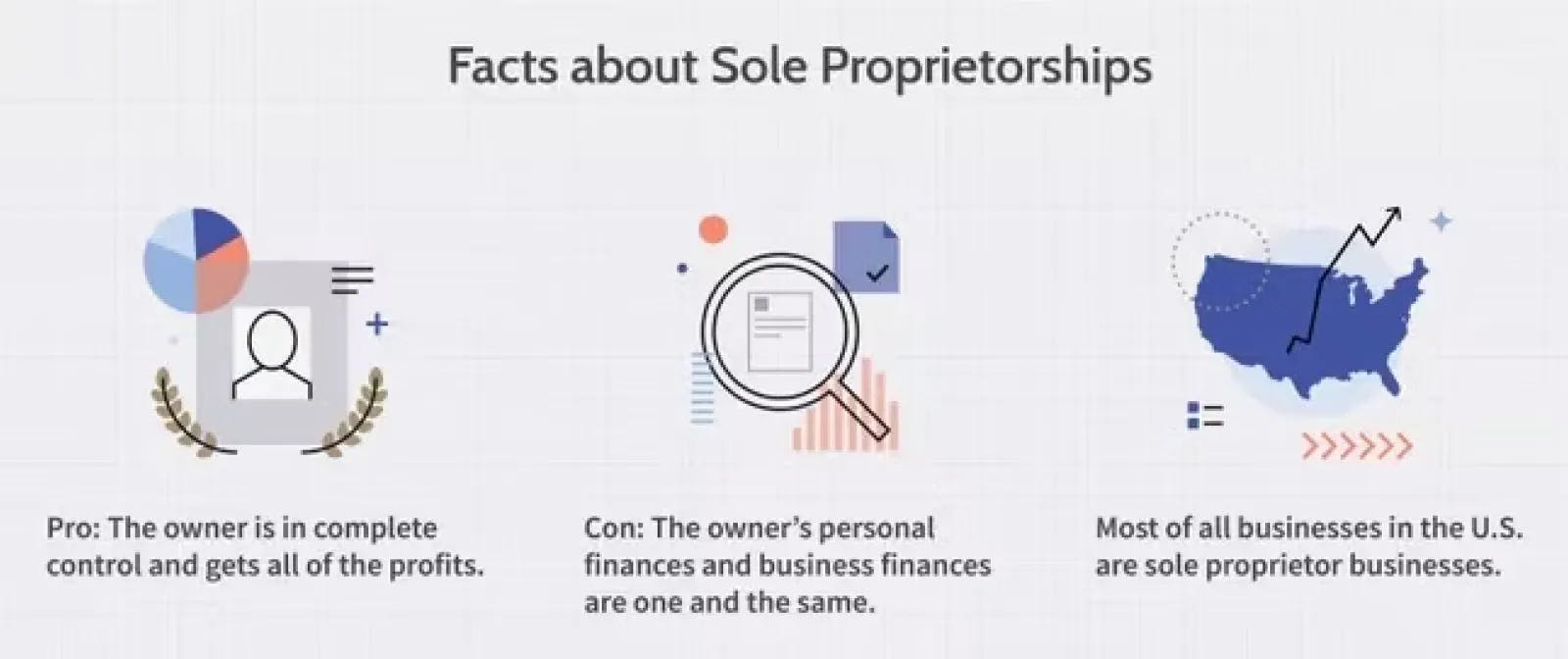Services

How Do I Change My LLC to Sole Proprietorship on My Own?
Please note: This post contains affiliate links and we may receive a commission if you make a purchase using these links.
Table of Contents:
For many small business owners, it’s a right of passage to form a business as an LLC. It’s exciting to file the paperwork and to receive the liability protection and lower tax burden that an LLC has to offer. But, that business entity may not work for everyone.
If you’ve taken our business entity quiz or run into a problem and found that an LLC isn’t right for you or your business, you can easily convert it back into a sole proprietorship. A sole proprietorship is when only one person runs the business. There’s no distinction between the business entity and the business owner, and there's no legal business entity filed.
How to Change Your LLC to a Sole Proprietorship
When you close a business, it’s known as dissolution. Changing your business entity from an LLC to a sole proprietorship requires you to follow the steps of dissolution to close your LLC and reform your business as a sole proprietorship. As the most common business entity, a sole proprietorship might be right for your business if you’re looking to simplify your business processes or are operating the business on your own after the loss of a business partner.

Each state has slightly different steps and procedures for the dissolution of an LLC, but the steps are generally the same. Below, you’ll find the basic steps you’ll need to take to dissolve your LLC. Before starting the process, be sure to check with your Secretary of State to find out the exact process in your state. While some states will let you convert your LLC to a sole proprietorship, it’s important to check because there could be repercussions from not dissolving your LLC properly.
1. Get Approval from All LLC Members
Before you can start any paperwork for dissolving your LLC, you need to get approval from all LLC members. If you’re the only member of your LLC, then that’s just you. Otherwise, you’ll need to have a meeting and come to an agreement with the other members of your LLC before proceeding with dissolution. Your documentation of the member’s agreement to dissolve the LLC can be as simple as a typed and signed paper.
2. File Your Dissolution Documents
Once you’ve come to an agreement with the other members of the LLC, then it is time to file your dissolution documents. These documents will be filed with the same state agency that accepted your Articles of Incorporation. For most states, this is the Secretary of State’s office.
If your business operated in more than one state, then you must file paperwork in those states as well. Once your dissolution documents have been filed, then you can file a Certificate of Withdrawal with any other states in which you’ve done business.
Filing both your dissolution documentation and withdrawal paperwork might incur a small filing fee.
Get Ready For Your Next Adventure.
Let Us Handle Your Business Dissolution Paperwork — So You Can Get Started On Your Next Great Idea.
File Dissolution

3. Notify All Creditors
Once you’ve filed your dissolution documentation, then you’ll need to notify all creditors that your LLC is closing down. Ask your creditors to:
- Send a final bill
- Set a deadline to receive payment
If you want to maintain a relationship with any of these vendors or suppliers, you can let them know at that time that you’ll be continuing your business as a sole proprietorship. They can then arrange to set up new accounts in your name instead of the name of your LLC.
4. File All Federal, State and Local Tax Forms
The next step in dissolving your LLC is to file all of your tax forms. Even though your business is in the process of dissolving, you’ll still need to pay all of the federal, state and local taxes that you owe.
The IRS has a checklist for closing a business that provides a list of the documentation you’ll need.
5. Keep Savings on Hand for Potential Liabilities
As your LLC closes down, you’ll find a number of expenses that need to be paid. The state in which you do business will not consider your LLC dissolved until it has paid all of its outstanding tax obligations, such as sales tax, franchise tax, income tax and any state-required employee payroll deductions. You’ll also need to pay any federal taxes that are outstanding.
To prepare for any potential liabilities, you'll want to estimate any expected fees you'll need to pay, add a little extra on top, and then keep those funds in an account in case you incur any fees.
6. Transfer Any Assets to Your Sole Proprietorship
Once you’ve figured out how much cash you’ll need to keep on hand for any future payments, then you can transfer any remaining money and assets from your LLC to your sole proprietorship. All assets must be transferred from the LLC to you as part of the liquidation and dissolution process.
Your business assets might include:
- Land
- Building
- Equipment
- Inventory
- Supplies
- Intellectual property
- Customer contracts
- Cash
- Accounts receivable
Converting ownership from one entity to another can be complicated and cumbersome, so this part of the process may take a little while, especially if you have a lot of different assets.
When you operate your business as an LLC, you have a wall between your business and personal finances and assets. When you dissolve your LLC and turn it into a sole proprietorship, that wall disappears. The dissolving of this wall turns your business assets into personal assets, which can leave your assets more liable to legal action.
7. Publish Your Dissolution
In some states, you’re required to make a public declaration of your LLC’s dissolution. This can be a notice in a public newspaper or a post on social media. This is done so that any entity, customer or business that needs to make a claim on your assets has notice that they must do so before your business is dissolved.
8. Transfer All Business Licenses
Once your LLC has been properly dissolved, it’s time to think about setting up your sole proprietorship. Setting up a business as a sole proprietor is simple. One of the only things you’ll need to do is transfer your business license or apply for a new one if you operate the type of business that requires a license.
If you don't need a business license, then you're ready to start your business. Starting a sole proprietorship is simple: just start selling your product or service.
Why You Might Want to Convert Your LLC to a Sole Proprietorship
Owning a business can be complicated. There are a number of different decisions that must be made throughout the lifetime of the business. This includes why you might want to start a business and why you might want to close it. There are a number of different reasons that you might want to convert your LLC into a sole proprietorship. The most common reasons include:
- Low cash flow or sales
- A sole proprietorship will better achieve the business goals
- Business mismanagement
- Bankruptcy
- Failure to comply with state law or to file an Annual Report
- Defective products
- Partner disagreements
- Succession planning
- Forced judicial dissolution
The Importance of Properly Dissolving Your LLC
By properly dissolving your LLC, you’re letting federal and state agencies, as well as the public, know that you’re no longer operating your business. While your business can continue as a sole proprietorship, it’s important to officially close the book on your LLC.
If changing your LLC to a sole proprietorship sounds like a lot of work or confusing, we want you to know that we’re always here to help. Bizee can dissolve your LLC for you and take the work off your hands so you can focus on what’s next for you. And if you're ever ready to get back to your legal entity, we can help with that too.
Get Ready For Your Next Adventure.
Let Us Handle Your Business Dissolution Paperwork — So You Can Get Started On Your Next Great Idea.
File Dissolution


Page Grossman
Page is a freelance content marketing writer with experience writing about small business, the future of the workplace and health. She also operates a weekly email newsletter where she shares advice on living an authentic, intentional life. When not writing, you can find Page traveling, fostering older cats and working as a sexual assault advocate.

like what you’re reading?
Get Fresh Monthly Tips to Start & Grow Your LLC










